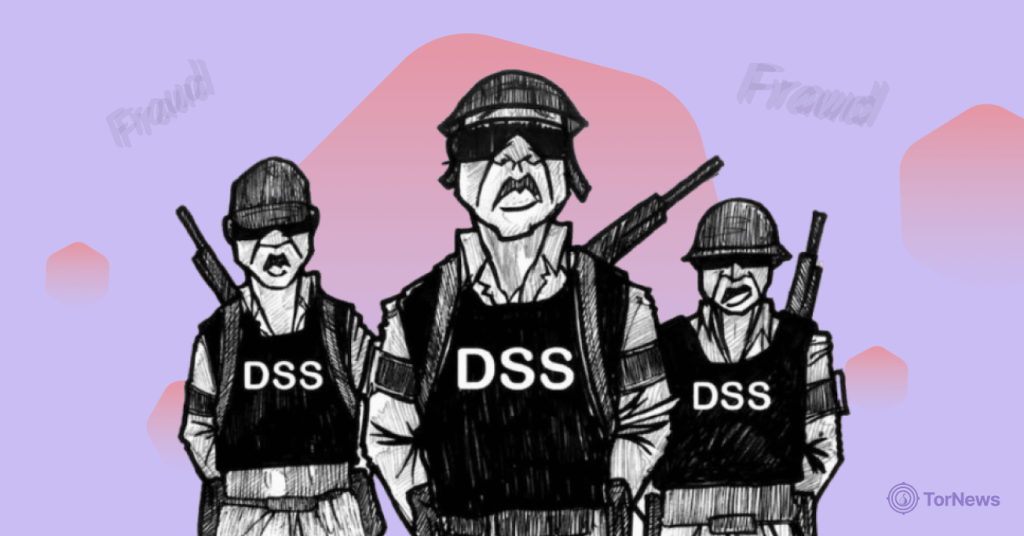-
The Department of State Services in Nigeria has evolved from engaging mainly in traditional security operations to being a key advocate against financial cybercrime by saving the country billions in losses.
-
In early 2024, the agency froze 12 accounts associated with advance-fee fraud schemes and financing terrorism, and intercepted N1.426 billion redirected from corporate accounts at various banks.
-
The DSS has transformed how Nigeria is addressing complex fraud schemes commingled with cryptocurrency and dark web portals through intelligence-driven operations and coordination with financial institutions.

For many years, Nigeria’s Department of State Services has been better known for its counter-espionage and internal security functions. It is evolving into potentially one of the most effective barriers against cyber fraud, which targets banks and other crucial components of the financial system.
As digital fraud continues to escalate into a national security crisis, the DSS is employing an intelligence-led approach to counter the problem with impressive success in cities like Lagos and Abuja.
Financial losses to cyber fraud are reaching unacceptable levels. Nigerian banks lost an estimated N17.67 billion in 2023 and more than N52 billion year-to-date in 2024, according to reports, nearly triple those amounts in 2020. For its part, Lagos appears to sustain nearly 50 per cent of financially defensive fraud activity.
The progress in fraud methods has surpassed traditional means of enforcement. Today’s fraudsters utilize phishing campaigns, fake banking apps, colluding insiders, and cryptocurrency for money laundering more efficiently than ever before. These threats are global in nature, as seen in recent events, like when hackers claimed an HSBC USA breach in a dark web post, though the bank denied it. Though we could almost say fraudsters were untouchable, now, with DSS’s effective strategy, the ground is changing.
Intelligence, not Headlines: the DSS Operational Model
In contrast to notable prosecutions seen through the Economic and Financial Crimes Commission, the DSS focuses on pre-empting fraud, which starts with early-warning intelligence protocols and cyber-forensic analysis. The senior officer explained, “The aim is to keep track of suspicious transactions and potential insider collusion before serious harm is visited upon a victim or targeted entity, routinely trying to avert further fraud against economic infrastructure.”
This approach helped the DSS eliminate some of the largest organized crime networks for fraud-related crimes in 2024. In one instance, they were able to secure court orders to freeze 12 accounts related to two suspects associated with advance fee fraud and financing of terrorism located in Abuja.
The accounts were at Ecobank, FCMB, GTBank, and Sterling Bank, holding proceeds from crime valued in the hundreds of millions of Nigerian naira. The DSS directed the investigation in the context of terrorism, and the new Police/Service has a responsibility under the Terrorism Prevention and Prohibition Act 2022 to conduct investigations, rather than simply as an economic crime case.
A separate operation in Lagos revealed a highly organized scheme that looted N1.426 billion belonging to an account in Access Bank, Fouani Nigeria Limited. The scheme then re-routed to other banks, including Providus Bank, Zenith, GTBank, FCMB, and UBA. The DSS received actionable intelligence, which led to obtaining a post-no-debit order, freezing the accounts for 90 days, and preventing money from leaving the country.
Collaborative Defense: Building a Financial Security Network
The agency’s success is largely due to partnerships. The DSS routinely works with the Central Bank of Nigeria, the Nigeria Financial Intelligence Unit, and EFCC to share intelligence in real time and coordinate account freezes across institutions. The DSS was able to participate in over 30 combined investigations and successfully trace and disrupt suspicious transactions in the quarter of 2024, when banks are said to have incurred 42.6 billion naira in losses to fraud.
The DSS has invested in preventative investigations as well by having ongoing intelligence exchanges with the banking sector, regular security briefings, and hosting workshops to build capacity throughout the banking sector. The cogent and collaborative framework has resulted in a quantifiable impact, as several financial institutions in Lagos and Abuja have reported fewer incidents of online breaches on a larger scale.
The agency operates on the principle of discretion as opposed to publicity. As one security analyst stated, the strength of the DSS is its invisibility—it tracks a digital trail and freezes funds before an intended public act occurs. This kind of operation has saved Nigeria billions of dollars and maintained the element of surprise in the game’s threat to the criminal network.
As cybercriminals change their attack methodologies, the DSS’s diligence is more critical than ever to Nigeria’s financial stability. It presently monitors cryptocurrency channels, dark web channels, and parallel market currency movement in Nigeria and has proven itself to be an integral element of Nigeria’s economic defense architecture. That aligns with broader global trends, where the dark web remains a key enabler for cybercrime, as detailed in our report on the dark web statistics.
The DSS, under the auspices of Director General Adeola Oluwatosin Ajayi, is operating the silent war, unobtrusively, without accolades for these schemes, but a truly critical feature – this will protect Nigeria’s banking system from becoming just another casualty of sophisticated cybercrime.